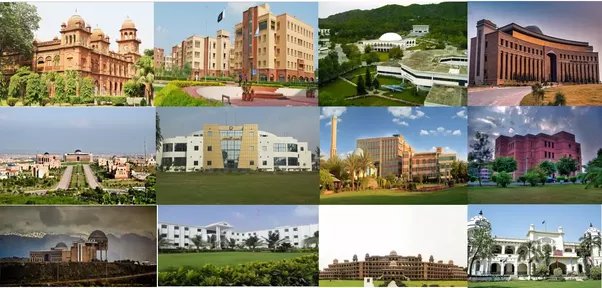
VCs Demand a Sudden Stop to the Construction of New Universities in Pakistan
More than 160 public and private universities from throughout the nation attended the two-day Vice Chancellors’ Committee conference in Islamabad, which was organised in a concerted attempt to address the urgent issues facing the higher education sector.
All of the vice chancellors of public universities expressed worry about the financial difficulties the colleges are currently facing. Stressing the critical role that funding plays in maintaining academic quality, they demanded that the government and university administration take swift corrective action.
Understanding that an increase in the number of universities would have a negative effect on education quality, the vice chancellors pushed for an immediate stop to the creation of new universities. They emphasised how crucial it is to combine current institutions in order to maximise effectiveness and resource allocation.
The meeting gave the heads of the universities a forum to have in-depth conversations and develop plans of action to deal with the challenging conditions facing higher education in the nation.
Dr. Iqrar Ahmad Khan, the chairperson of the VCs’ Committee, chaired the meeting, which was also attended by Dr. Mukhtar Ahmad, the chairman of the Higher Education Commission (HEC), Dr. Zia Ul-Qayyum, the executive director of HEC, and HEC division heads.
They emphasised the need to reduce the number of new development projects and shift attention to finishing off ongoing projects, especially those that are nearing completion, in order to optimise resource utilisation.
The delegates expressed gratitude to the Sindh government for a significant increase in the budgetary allocation towards higher education. However, they stressed the need for ongoing financial support from provincial governments and encouraged other provinces to consider doing the same.
The Vice Chancellors decided to impose strict measures targeted at reducing needless expenditure within institutions, demonstrating their strong commitment to economic responsibility. It was also decided to designate financial professionals as university treasurers rather than general cadre officers or faculty members.
The significance of adopting e-governance technologies to improve transparency, expedite administrative procedures, and support data-driven decision-making was also emphasised throughout the discussion.
The leaders of the universities emphasised the significance of investigating cutting-edge methods for resource creation while acknowledging the necessity of diversifying revenue sources. They highlighted the possibilities for alumni involvement, public-private collaborations, and other potential measures to support financial sustainability. The transformative power of endowment funds in promoting academic success was also well acknowledged.
The participants reached a consensus that a thorough assessment and alignment with worldwide best practices were required for both the faculty appointment criteria and the vice chancellor selection process. In a similar vein, agreement was reached to move universities away from pensionable hiring in order to reduce long-term financial obligations.
The panel stated that there is an urgent need to build a standardised performance-based faculty appointment service structure, given the difficulties HEC and the universities are facing as a result of the two parallel systems of TTS and BPS for professor appointments. The only method of appointment under this suggested system would be open competition, and faculty performance would be assessed annually in order to determine eligibility for financial rewards.
The participants also agreed that special consideration is needed for research quality at the MS and PhD levels. Concern was voiced regarding cases of unethical behaviour that jeopardise the reliability and validity of research.
They stressed the need for strong institutional structures that oversee research ethics, strict anti-plagiarism policies, and educational initiatives that stress the value of academic integrity and respect to moral principles.
Analogously, there was a great deal of discussion over the Triple Helix initiative, the financing source for research projects, the function of ORICs and BICs in fostering innovation and commercialization, and the classification of research journals.
The new Institutional Affiliation Policy, which strives to preserve academic standards and protect the future of the students, was also discussed during the conference. In a similar vein, the Vice Chancellors stressed the necessity of a thorough Trans-national Education (TNE) Policy framework to oversee and encourage global partnerships, exchange initiatives, and offshore campuses.
Having acknowledged the revolutionary possibilities of digital technology in education, the Vice Chancellors stressed the significance of utilising IT facilities, research networks, and digital library resources to improve teaching, learning, and research results.
Speaking during the forum, Dr. Mukhtar Ahmed stated that raising the bar for postsecondary education and working together to overcome obstacles to its advancement are the common goals of HEC and all other players in the higher education sector. He referred to universities as rays of hope for society and acknowledged the role they play in the advancement of the industry.
According to Dr. Zia Ul-Qayyum, a robust higher education sector requires the consolidation of policies and standards developed by HEC in conjunction with all relevant parties. Dr. Iqrar Ahmad Khan expressed gratitude to the attendees for their initiative in developing suggestions for improving the higher education industry and their pledge to put those suggestions into practice at their individual schools.

Content writer, educationist, teacher, researcher, social media manager, and a SEO manager from lahore. She has been working as a freelance academic and non-academic writer for more than 10 years now. She has a passion to learn new things and has a knack for writing and she combines both things to produce write ups she pours her heart out in.

